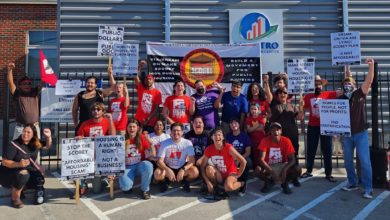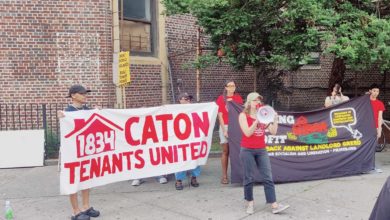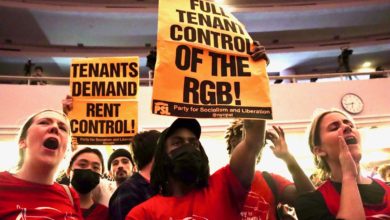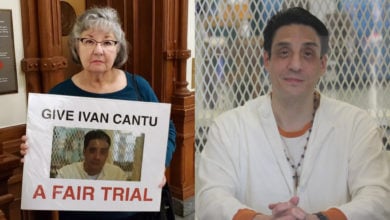Chinese translation of this article available here
In July 2022, it was revealed by Philadelphia 76ers that a new $1.3 billion basketball arena — so-called 76 Place — was planned to be constructed adjacent to the historic Chinatown neighborhood of the city. The 76ers formed 76 DevCorp with billionaire David Adelman, a development company created for overseeing the arena project. Adelman is also the CEO of Campus Apartments, a notorious development company that is the main engine behind the University of Pennsylvania’s attempts to displace West Philadelphia’s mostly Black, working-class population.
The proposed stadium is one part of the ever expanding push to create a “New Philadelphia” — a version of the city that caters to the rich, white elite of the city and its surrounding suburbs. It is a project of the capitalist class that treats Philadelphia as their profit-making playground, and Philadelphians as disposable.
If the stadium is constructed, it is certain that for the local residents, the cost of living will spike, quality of life will drastically deteriorate, and countless people will be displaced. The arena threatens to eradicate the historical Philadelphia Chinatown, which for over a century has served as a sanctuary for immigrant workers and a unique cultural hub for all.
In the months following the proposal, the capitalists behind the proposal met with a handful of Chinatown business owners to win them over. Chinatown community leaders divulged that a small number of hand-picked organizations based in the neighborhood intended to form a steering committee to negotiate a Community Benefits Agreement that will direct $50 million to the community over a period of more than 10 years, in order to alleviate the negative effects of the arena construction. This sum of money, even if distributed appropriately, is hardly even a bandaid on a fatal wound that this arena would inflict on the Chinatown community.
It is clear that the majority of Chinatown residents and small business owners oppose the new stadium. A broad movement to fight back and save the neighborhood has emerged in the months since the proposal first became public.
Students and residents take to the streets
In November 2022, over 200 university students and Chinatown residents marched from the University of Pennsylvania’s College Hall to Adelman’s Campus Apartments headquarters and protested against the construction of 76 Place. The protest was organized by student activist groups from UPenn and Drexel University, such as Students for the Preservation of Chinatown (SPOC) and Coalition to Save UC Townhomes, and the Philadelphia branch of the Party for Socialism and Liberation.
Kaia Chau of SPOC said that “a lot of people don’t understand why an arena is so harmful, especially to low-income communities … but the purpose of an arena is to keep business inside of the arena — if you put one right next to Chinatown, the business is going to go away, not to mention the increase in traffic, which will have really bad environmental and health impacts.”
Taryn Flaherty, another organizer from SPOC, warned that “the arena will be built if we do nothing … the arena will be built if there’s only slight resistance … there needs to be a huge pushback.”
Both Chau and Flaherty grew up in the Chinatown community, which has seen movements against other major developments in the past years, including a Phillies ballpark in 2000 and a Foxwoods casino in 2008. The resurgence of their activism today signifies that the looming threat to gentrify Chinatown out of existence never disappeared.
Deborah “Debbie” Wei, a well-respected Chinatown resident, activist, and founder of Asian American United (AAU), warned that the developers “dangle money, like community benefits agreements, which have not worked anywhere.”
Wei also revealed that such a big project is going to need zoning ordinances from the city government, demanding the “City Council to work with us to make sure that we at the very least get a really sound environmental impact statement, and not get any zoning until that is done so we can actually see through study what the damage is going to be to our community.”
The Chinatown community in Philadelphia, like others across the country, is still recovering from the sheer neglect throughout the COVID pandemic and the “Trump-craze” xenophobia, said Wei, and “between the closure of the restaurants and the violence, folks are desperate, they’re looking for an answer.” She then condemned the cruel motives of billionaires like Adelman for coming to a community that’s been devastated, and exploiting that devastation for their own gain. Finally, Wei stressed that “this city doesn’t exist without its neighborhoods and its residents — we don’t exist so suburbanites can come here and get entertained; we don’t exist so billionaires can consume communities in order to make their own profits!”
Developers challenged in fiery community meeting
Following the student-led protest and continuous community backlash, on December 14, developers held a public forum for Chinatown community members and organizations. Attendees decried the fact that community residents had been excluded from the conversation over the development.
David Gould, who is the Chief Diversity and Impact Officer for the project, deployed numerous nice-sounding but deeply deceptive talking points to present the development as a beneficial project. Gould claimed that he and his bosses are “good corporate citizens,” and threatened that if 76 DevCorp doesn’t take up the development, then another company with worse intentions will do so.
The crowd, which attended with signs and posters reflecting opposition to the arena construction, responded with passionate remarks that challenged developers and exposed their exploitative interests drenched with destructive consequences. Debbie Wei proclaimed, “what people don’t understand is that fighting for justice in this particular community is a tradition.”
Throughout the meeting, chants of “hands off Chinatown” spilled out the doors of the room and into the streets.
A better future — make development community-controlled
The 76ers stadium proposal must be stopped in its entirety if Chinatown is to survive yet another development plan. There are a number of steps that should be immediately taken by people in positions of power:
- First District Councilperson Mark Squilla — say no to the stadium proposal!
The actions of Josh Harris, David Adelman, and other corporate executives funding and planning this project are reprehensible and must be opposed. However, they are what they are: capitalists. They will do anything it takes to line their pockets and reshape the city to fit their class interests. The focus of any action must be centered on those who have the legal means to stop the proposal in its tracks.
Mark Squilla is the city councilperson of the district that contains Chinatown and the proposed site of 76 Place. Councilmanic prerogative, a longstanding, archaic practice of Philly’s City Council, ensures that Squilla’s refusal alone could scrap the project. Under this tradition, all members of city council agree to vote the same way on a major development as the councilmember who represents the district in which it is being planned. While it is not a law, councilmanic prerogative is respected as though it is one. A report released by Pew Charitable Trusts examining six years of legislation that involved councilmanic prerogative found that, “the whole Council did not vote against a district Council member’s wishes in one of them. Of the 730 bills studied, 726 passed unanimously.”
While this power is usually used to negative ends, in this case it means that Mark Squilla can single-handedly torpedo the 76ers’s disastrous stadium proposal. But, if he doesn’t, then the rest of Philly’s City Council must put aside the tradition, go against councilmanic prerogative and stand with Chinatown!
- Philly mayoral candidates — stand with Chinatown!
The Democratic Primary for Philly’s 2023 mayoral election takes place on May 16. Whoever wins the primary will most likely become Philadelphia’s mayor, as a Republican has not won this election since 1948. Regardless of each candidate’s political affiliations or connections, they must definitively answer this question: Do you oppose the 76ers stadium proposal?
It isn’t enough to demand that 76 Place developers should listen to community members. The proposed Community Benefits Agreement is part of a tried and true method of pacifying people with false promises while plowing ahead with their harmful developments. Only the complete defeat of this proposal will allow Chinatown to continue to exist and serve as a cultural center of our city.
- Make Chinatown a protected Historic District
Chinatown’s history of resisting harmful developments is a source of pride for residents, and it serves as an example for other neighborhoods in the city. But this history is also a warning. Even after defeating this proposal, Chinatown will still remain at risk as a target for gentrification by way of ruthless development and displacement.
One possible way Chinatown’s community could resist future attacks would be to secure for the neighborhood the status of a Historic District. This will protect buildings in the neighborhood from demolition. In November 2022, West Philadelphia’s Powelton Village, one of the many neighborhoods facing the unending expansion of student housing, achieved this status. This victory came thanks to the dedicated efforts of community organizers.
Chinatown’s location in Center City could make it difficult to attain this legal status compared to other Historic District neighborhoods. Nonetheless, with the power of the people, anything is possible — especially for a neighborhood as organized and resilient as Chinatown.
Chinatown does not have to undertake these struggles alone. All of Philly’s neighborhoods have an interest in standing with Chinatown and dealing a blow to the corporate vultures who destroy community after community in search of profit.






